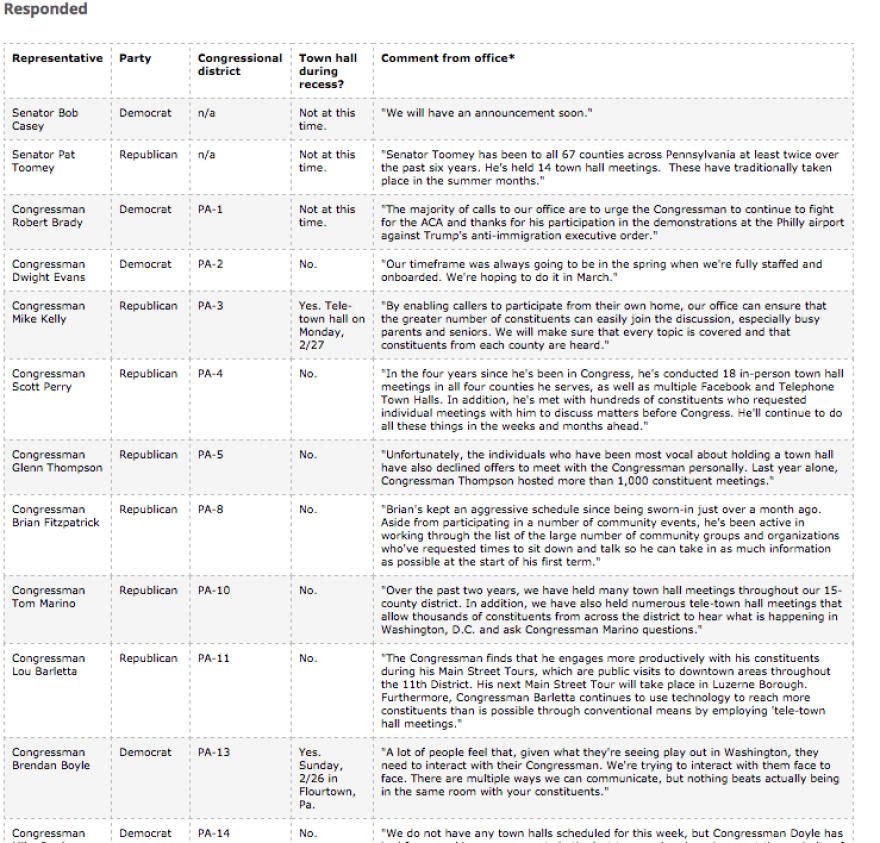At a people’s town hall in Washington, Pa., southwest of Pittsburgh, an audience of about 45 listened to Leeann Howell talk about how repealing the Affordable Care Act would affect her.
Without the ACA, Howell said she’d have to quit her job and become her son’s 24-hour nurse.
“I’m the breadwinner in my family, I always have been. If I can’t work, then my family loses everything,” she said. “It’s not perfect, but let’s fix it.”
Howell said she asked her Congressman, Republican Rep. Tim Murphy, who represents the 18th District, to reject the repeal of the act. But although he was invited to the town hall, Murphy did not attend.
Across the commonwealth, residents are calling for town halls while Pennsylvania’s legislators are home this week for the district work period—regularly scheduled days when they leave D.C. to tackle constituent concerns. But if representatives don’t schedule public meet-ups, constituents sometimes will.
On Tuesday, “with or without” town halls were held for Rep. Glenn Thompson (R-5), Rep. Mike Kelly (R-3), Rep. Keith Rothfus (R-12), Rep. Tim Murphy (R-18), and Sen. Pat Toomey (R).
Keystone Crossroads contacted the offices for all 18 congressmen and both senators. Three confirmed they would be holding town halls during the recess. Some remained undecided; others reiterated their numerous public events, and six offices did not respond to repeated requests for comment. Many offices confirmed they had received requests for town hall meetings. A round-up of their responses is below.

Wonder where your representative falls? Click here for more.
The Washington event focused on access to health care, and the difficulties many people would face if the ACA were repealed. But then the floor was opened to broader concerns.
“So, where is Congressman Murphy?” a woman asked. “Was he notified of this and what does he say or what does his office say about why he’s not here?” Before anyone could answer, Matt Cairone stood up.
“I’ll take an educated guess. He’s hiding from this,” said the Cecil Township resident. “He doesn’t want to come here and answer these questions, and as our representative, he needs to do that.”
Kathleen Kleinmann is CEO of the Tri-County Patriots for Independent Living, which helped organize the Washington, Pa. event. She said it’s possible the invite got lost between Murphy’s local and D.C. offices, though she had the impression there could be another reason.
“The representatives are kind of in general afraid to go to these kinds of events. Because they’re being attacked.”
A spokesperson for Congressman Lou Barletta (R-11) said in a statement that traditional town hall meetings are not the most effective way for the congressman to talk with his constituents.
“Unfortunately, the disruptive behavior of a few people prohibit others from having a productive conversation,” adding that he was willing to sit down with anyone “including those who have opposing viewpoints.”
Representative Glenn Thompson’s office said in a statement that he welcomes all constituents to meet with him, voice their concerns, and find common ground. “What he will not do is offer a venue for paid activists and political opposition to create a spectacle.”
However, those without town halls scheduled this week aren’t necessarily ducking the voters: many representatives hold regular tele-town halls that don’t fall during this week, or have public events lined up in the coming months. Recently-elected Congressman Brian Fitzpatrick (R-8) began a 100-business tour this year, as well as a health care listening tour.
Lee Bloom said he attended the town hall in Washington, Pa. in order to encourage Murphy and other Congressmen to be a check on the White House.
“I’m concerned that these Republicans are worried about their party and not the country. And none of them are having the guts to say what they really think about what Trump’s doing. They’re backing him up. That’s what worries me. That scares me,” he said.
As the meeting wound down, people talked about the best way to create dialogue with their elected representatives. “None of us here are paid to be here!” a woman said, as she passed the microphone to her neighbor.




